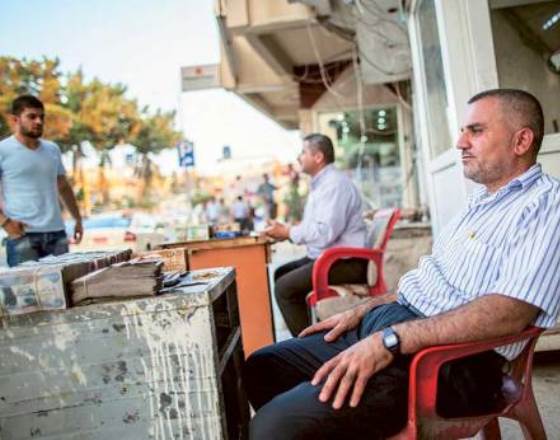
Iraqi Kurdistan's cash-strapped government has seized billions of dollars in deposits at two branches of Iraq's central bank since 2014, bankers said, calling into question the region's image as a business-friendly paradise in the Middle East.
Since Baghdad cut budget payments to Kurdistan in January 2014, the Kurdistan Regional Government (KRG) has struggled to meet the public payroll and is now several months in arrears.
The fight to drive back Daesh, which swept across the Syrian border and towards the regional capital Arbil in June of that year, has been an added drain on the budget.
Though initially envisioned as a temporary measure, the KRG finance ministry's practice of tapping funds that banks had deposited in their current accounts at local branches of Iraq's central bank continued as Kurdistan's economy, which boomed after the 2003 US-led invasion of Iraq, deteriorated.
Private banks, including institutions from Lebanon, Jordan and the UAE as well as state-run Iraqi lenders, may sue or threaten to divest from the oil-rich northern region if their funds are not released soon, bankers said.
Bankers and KRG officials said the regional government first tapped into banks' deposits at local central bank branches in 2014 after then-Prime Minister Nouri Al Maliki cut Kurdistan's share of the federal budget â its main source of income â in a dispute over the region's independent oil sales to Turkey.
Baghdad, which is also facing a budget crunch due to low oil prices and the fight against Daesh, said direct oil exports violated the constitution, though Kurdistan is now exporting more than 500,000 barrels per day (bpd) of oil to as many as 10 countries.
"We funded the revenue gap through advances from banks including the Central Bank of Iraq's branches in Erbil and Sulaimaniyah," said Qubad Talabani, KRG's deputy prime minister.
"Ultimately it's a liquidity issue caused by the fiscal crisis in Baghdad." That move led to freezing around two dozen banks' current accounts at central bank branches in Kurdistan, bankers told Reuters. Talabani confirmed banks operating in the region had problems accessing their funds.
The KRG says it is desperate for funds to finance its Peshmerga fighters, while an influx of more than one million people displaced by violence in the rest of the country has put acute strain on the region's resources.
It also owes millions of dollars in arrears to international oil companies such as Norway's DNO and Genel Energy, which have been developing oilfields in Kurdistan.
It is unclear exactly how much money is at stake, but interviews with nearly a dozen bankers and officials suggest it is in the range of $2-6 billion.
Ali Tariq Mostaf, executive director of the Iraqi Private Banks League, estimated the deposits at over $2 billion.
Bankers said the share of seven Lebanese banks' deposits totalled nearly $100 million. Iraqi banks have much more money invested, they said, with at least 15 local lenders thought to hold up to $200 million each. Reuters was not able to contact all the banks operating in Kurdistan.
"Our accounts have been frozen for a year. We cannot have a single penny from the central bank of Erbil. If I ask for one dinar, they don't give it to us," said one of the bankers, echoing the concerns of others who all spoke to Reuters on the condition of anonymity.
Reuters could not independently verify the value of the/sfrozen deposits. The head of Iraq's central bank did not respond to a detailed request for comment, and Talabani declined to quantify the amount of money affected.
PARADISE LOST? The relative security of Kurdistan, largely unaffected by war, has in recent years made it a safe haven in Iraq, a major Opec oil exporter stunted by generations of conflict, sanctions and neglect.
The region has billed itself as a progressive, pro-business market for Western investors who have eyed it as an end in itself or an entry point for the rest of the Iraq when it becomes more secure.
The capital Erbil has clubs, restaurants and a feeling of safety that allows residents to stay out after dark. But hard times have forced the KRG to moderate its ambitions.
Talabani described the lack of liquidity as a nationwide problem, but said "our situation is more acute because we're not a state. We don't have the economic levers of a country." Plans to issue a $500 million international bond earlier this year were opposed by Baghdad as an overstep of regional authority. Falling oil prices, rising geopolitical tensions and a difficult backdrop for emerging economies stalled the scheme.
A London court ordered the KRG last week to pay $1.98 billion to a consortium including the UAE's Dana Gas/swithin 28 days.
"It's a troubling time right now in Kurdistan economically," said Talabani.
Kurdistan's 2014 budget deficit was almost 8 trillion Iraqi dinars ($7.23 billion) and could reach 3 trillion dinars this year, he said.
The banking dispute could also widen the region's economic and financial separation from the rest of Iraq, with the central bank in Baghdad already appearing to distance itself further from branches in Erbil and Sulaimaniyah.
A spokeswoman for the Iraqi central bank said the Kurdistan offices were independent: "Erbil and Sulaimaniyah do not belong to the central bank; they belong to the region." Talabani disputed that. "They're technically branches of the Central Bank of Iraq and therefore it is the Central Bank of Iraq's responsibility to ensure liquidity to these branches", he said.
Iraq's central bank asked private banks last week to provide documentation of their deposits in the northern branches in preparation for a visit to Kurdistan to try to resolve the issue, but Talabani said the underlying liquidity problem showed no sign of letting up.
"We had to manage this shock in the best way that we could," he said. "We couldn't stop functioning as a state."
original source: http://gulfnews.com/business/economy/iraqi-kurdistan-s-cash-crisis-hits-banks-and-the-region-s-promise-1.1631373
